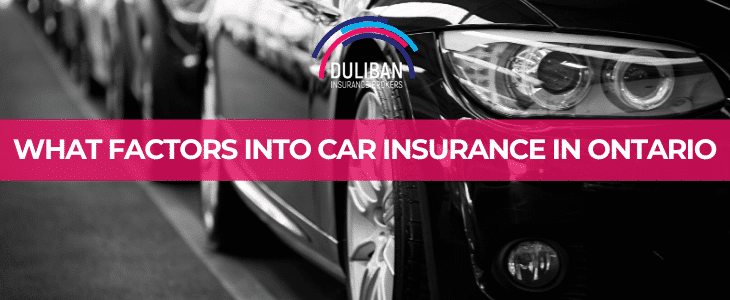Have you ever wondered what factors into car insurance rates? Canadian insurers consider a wide variety of factors when calculating your premium. Below, you’ll find out which considerations play the most significant role, which coverages are mandatory, and how to fill policy gaps with additional protection options.
How Car Insurance Rates Are Calculated
Car insurance companies consider various factors when calculating your premium. Your driving history and experience, along with the specifications of your particular vehicle are the two areas that will interest your insurer the most. Below are the top factors that influence your auto insurance rates.
Address of the Vehicle
If you live in an urban area, your car insurance rates are likely to be higher than in rural locations. For example, an address in Toronto will have higher prices since there is more traffic, higher frequency of claims, and rush hour traffic that can cause accidents.
Age of the Driver
Drivers under the age of 25 are considered higher risk because they have limited driving experience. Since young drivers have a higher probability of getting into an accident, premiums tend to be slightly higher.
Experience
Insurers consider how many years driving experience and whether or not you completed a safe driving course. Insurance companies also favor drivers with a history of continuous insurance coverage. The G1, G2, and G levels on your driver’s license indicate your driving experience.
Driving Record
If you have six tickets or more and aren’t responding to appropriate driving guidelines of the province, you’ll have higher premiums. Insurance companies typically don’t want to insure drivers with significant infractions on their driving record. Premium rates decrease, the longer a driver goes without having an accident.
Gender
Unfortunately, statistics show that male drivers under the age of 25 typically have higher insurance premiums based on the frequency of claims.
Type of Vehicle
Generally, larger vehicles have lower premiums since they offer better protection against injuries. Larger vehicles are also higher off the ground, which decreases the severity of an impact to passengers, according to the Insurance Bureau of Canada Crash tests. However, there are a variety of other factors about your specific vehicle that contribute to your rate.
- Potential repair costs
- Make, model, and year
- The probability of your car being vandalized or stolen
Rates tend to be higher for new, luxury, and sports car. However, safety features can help lower premiums.
Vehicle Use
Insurance companies examine how often you use your vehicle. The carrier will consider whether you are using your car for personal or commercial use, such as ride sharing or pizza delivery. If you plan to drive for commercial purposes, you’ll need additional coverage.
Annual Kilometer Stand
The insurer may also look at the number of kilometers you drive annually. Longer commutes usually result in higher rates since there’s an increased chance of getting in an accident.
Cancellations for Non-Payment
If you have been canceled in the past for non-payment of premiums, this could lead to higher rates. Your insurer may even choose not to renew your policy since they don’t want to accept the risk. Regularly paying premiums on time demonstrates financial responsibility, and helps keep your rates low.
Types of Coverage that Factor into Car Insurance Rates
There are different types of coverage to choose from. Some policies are mandatory, while others are optional or extend your standard protection limits. Each province has various regulations regarding necessary coverage levels.
Liability
Third-Party Liability Coverage provides financial compensation to any individuals injured or property damaged during a car accident. You’ll need a minimum of $200,000 coverage in most provinces. However, we recommend increasing your policy to $1 or $2 million. If you’re involved in a severe accident, expenses can add up quickly.
Accident Benefits
The second mandatory policy is Statutory Accident Benefits Coverage. If you’re injured in an accident, these benefits will help pay for your treatment and recovery. Some plans also offer compensation for income lost while you are unable to work.
Collision and Comprehensive Coverage
Collision coverage is typically an optional policy that covers the costs of repairing damage to your vehicle after an accident. Comprehensive coverage offers protection against covered perils not listed under your collision coverage. Some examples include vandalism, windshield damage, falling or flying objects, and theft.
Endorsements
With endorsements, you can customize your policy to include protection from specific risks. For example, you need a rider to drive government vehicles, permission to carry passengers for compensation, and a rider for recreational vehicles.
A waiver of depreciation is recommended for individuals with brand new cars. You’ll receive enough compensation to replace the vehicle after a total loss, instead of the depreciated value.
We always recommend full coverage with increased accident benefits and liability. Lawsuits, legal fees, and medical expenses can easily exceed the standard limits.
How to Get Discounts
There are many ways to lower your car insurance rates in Canada. Below are some suggestions to get lower premiums.
- Telematics – The Canadian Loss Experience Automobile Rating (CLEAR) assesses how likely a vehicle is to be in an accident. Buying a car that experiences fewer claims, and losses can help lower your rate.
- Good Student – Students under the age of 25 with higher grades usually save between 10% to 25% on car insurance rates.
- Multi-Vehicle/Multi-Policy – Insuring both your home and vehicle or multiple vehicles with an insurer can get your discounts.
- Anti-Theft – If you have features on your car that protect it from theft, you may be eligible for discounts.
- Hybrid Vehicle – Hybrid vehicle discounts reward drivers that have eco-friendly cars.
Many different discounts are available in different provinces. Other rate deductions are available if you have private parking, winter tires, a new vehicle, specific profession, or graduated driver’s license.
Final Thoughts
To learn more about Car Insurance Rates, contact our brokerage at Duliban Insurance today at 1-855-385-4226.












